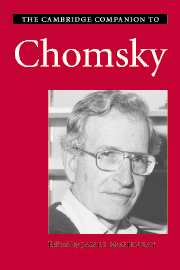Book contents
8 - Innate ideas
from Part II - Chomsky on the human mind
Published online by Cambridge University Press: 28 May 2007
Summary
Here’s one way this chapter could go. After defining the terms “innate” and “idea,” we say whether Chomsky thinks any ideas are innate - and if so, which ones. Unfortunately, we don't have any theoretically interesting definitions to offer; and, so far as we know, Chomsky has never said that any ideas are innate. Since saying that would make for a very short chapter, we propose to do something else. Our aim is to locate Chomsky, as he locates himself, in a rationalist tradition where talk of innate ideas has often been used to express the following view: the general character of human thought is due largely to human nature.
One can endorse this view without saying that humans have specific concepts, like t u r n i p or c a r b u r e t o r, independent of experience. Correlatively, it is important to remember that while Chomsky is a nativist about language, he does not think that specific languages are innate. Whether a child ends up speaking Japanese or English, or both, clearly depends on the child’s experience. The nativist claim is that all natural languages share core features that reflect the biology of homo sapiens. Knowing a language, like having a heart, is a reflection of our biological endowment. Just as humans have internal organs with characteristic traits, they speak languages with characteristic traits. According to Chomsky, linguistic variation is severely constrained by the mental systems that make human language possible. But this is compatible with some linguistic variation across (and within) communities, since the traits of individuals are always products of nature and nurture. Diet and exercise affect one’s heart, within a limited range of possibilities. Similarly, experience affects the course of a child’s linguistic development, within certain parameters.
- Type
- Chapter
- Information
- The Cambridge Companion to Chomsky , pp. 164 - 180Publisher: Cambridge University PressPrint publication year: 2005
- 5
- Cited by



